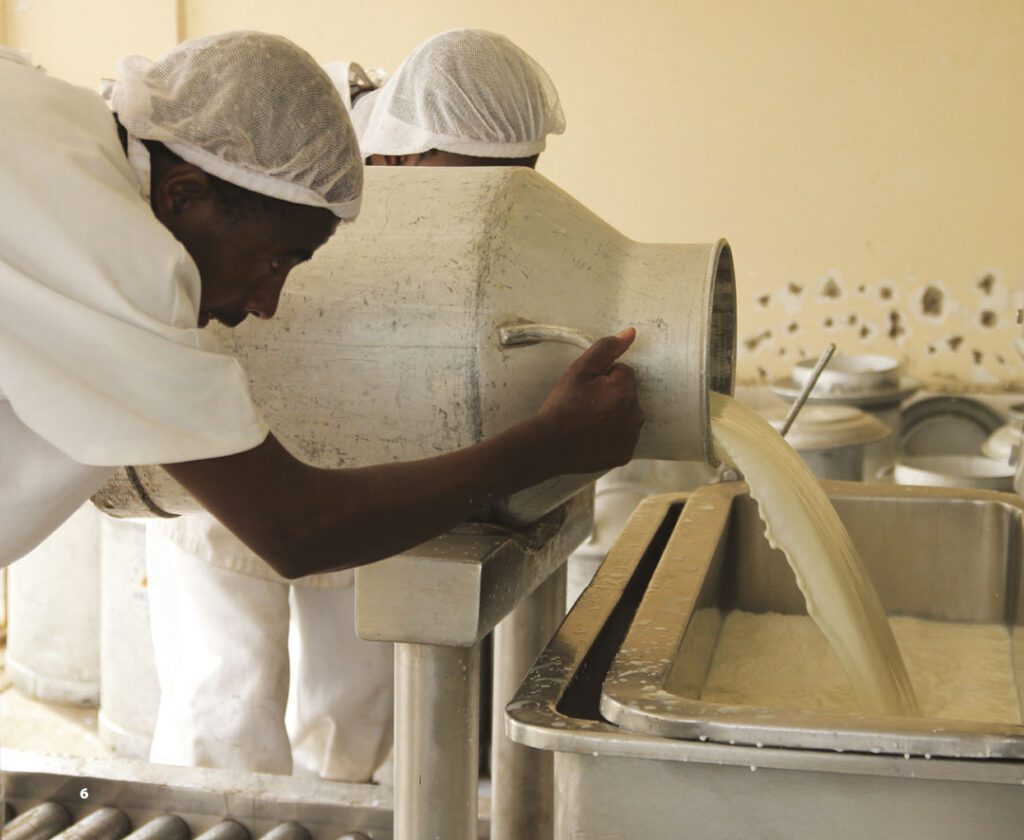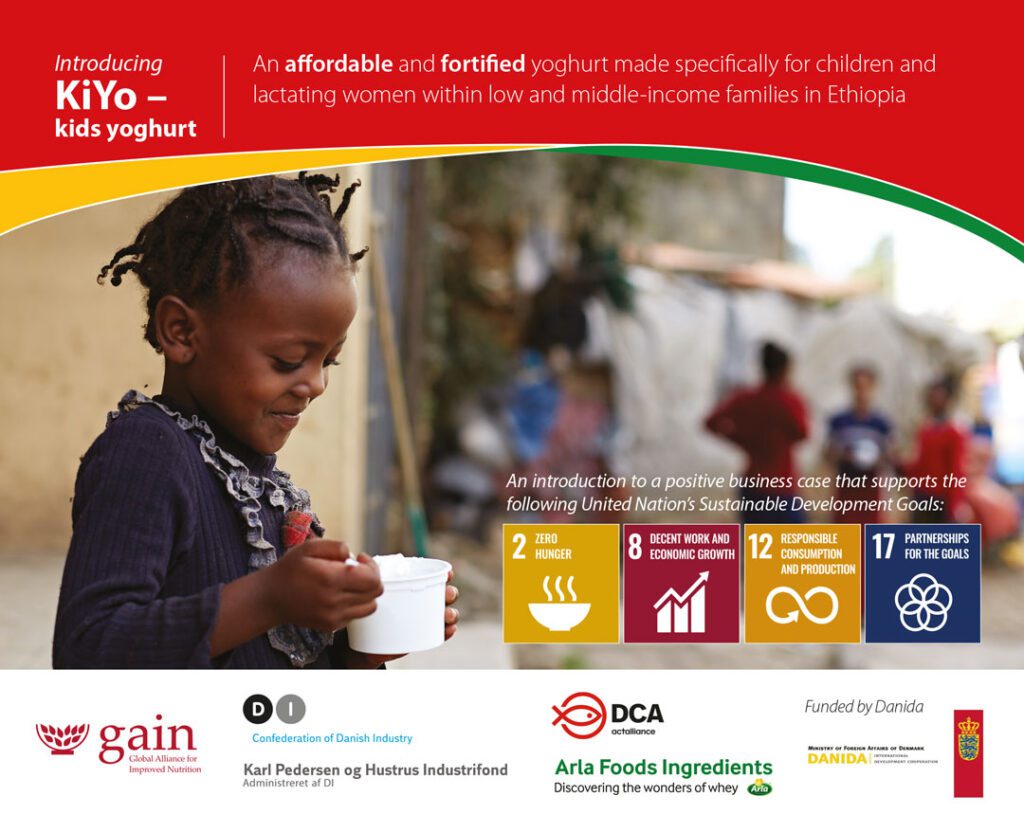Share this page
GAIN Access to Better Dairy project
Developing safe, nutritious and affordable yoghurt in Ethiopia

Alignment with SDGs
AUTHOR
Charlotte Sørensen Arla Foods, Aarhus • Denmark
In a nutshell
Through the GAIN Nordic Partnership, and in cooperation with DanChurchAid, the Confederation of Danish Industry and two Ethiopian Dairy Companies, Arla Foods Ingredients is working to connect low-income families with affordable foods based on milk from Ethiopia’s 11 million cows.
At the same time, the aim of the GAIN Access to Better Dairy project is to build a sustainable dairy chain in collaboration with smallholder farmers and two local dairies.
As lead business partner, AFI’s role is to equip the two dairies with the capabilities to produce a safe, nutritious and affordable yoghurt for sale in Ethiopian markets and kiosks. The yoghurt recipe contains our whey permeate – an ingredient rich in milk minerals and lactose – to maximise the dairies’ yoghurt production and ensure a good taste and consistency.
A third example of our involvement has been smaller holder farmer training via one of our farmer owners who has twice visited Ethiopia to share his knowledge and best practise in the true spirit of cooperative engagement.
The initiative works across the entire value chain, including smallholder farmers, dairy processors, distributors, sales agents, and consumers.
Introduction
As one of the world’s leading whey ingredient suppliers, Arla Foods Ingredients sees and embraces two key opportunities:
1. Supporting Ethiopia’s health and poverty agendas
Despite having one of the highest dairy cattle populations in the region, the consumption of milk in Ethiopia is only 19 kilos/year per person, which is one of the lowest consumption levels in sub-Saharan Africa (average 30.2 kilos/year), and far below the WHO recommendation of 175 kilos/year. Ethiopia is facing the challenge of 38% of children aged 6-59 months being stunted and 57% being anaemic. Only 7% of Ethiopian children aged 6-23 months meet the minimum acceptable dietary recommendations. Even in suburban areas, stunting is still as high as 25%, and the prevalence of anemia is 49%. Women and children are particularly vulnerable. The lack of access to affordable and processed dairy products among low-income segments in Ethiopia is largely due to the fact that only 5% of farm milk reaches the formal market via professional dairy factories. The majority of milk produced is consumed by the farmers and their families, sold as raw milk, or lost. Milk loss is mainly due to inefficiencies within the dairy value chain in Ethiopia. 20-35% of the milk produced gets spoiled due to the lack of cold chain management, and a poor infrastructure for milk collection. Consequently, the price of raw milk is very high, making dairy products relatively expensive for consumers. In addition, the fluctuating supply and quality of milk poses a significant challenge for dairy producers.
As well as being a health issue, malnourishment is directly linked to poverty. Malnourished girls often leave school early, marry young and give birth to malnourished babies – continuing the vicious circle of malnutrition that traps people, communities and countries in poverty. It is estimated that malnutrition is responsible for a more than 16% loss in Ethiopia’s gross domestic product. One of the drives of the project was therefore growing year-round demand from children and mothers for safe, affordable, dairy-based products.
Working with our partners and the whole local dairy value chain, we have collectively developed an affordable, safe, nutritious yoghurt to support the fight against malnutrition in Ethiopia. By breaking the circle of malnutrition, the project also hopes to contribute to lifting Ethiopians out of poverty and therefore secure a brighter future for the next generation.
In respect of the yoghurt production, Arla’s contribution is two-fold:
- We provide our whey permeate – an ingredient rich in milk minerals and lactose – to maximise the dairies’ yoghurt production and ensure the yoghurt has a good taste and consistency.
- We have equipped two dairies – Loni Dairy and Family Milk – with the capabilities to produce the yoghurt through the sharing of our technical dairy production expertise, supporting product innovation and assisting in the implementation of quality assurance control and best practices.
2. Supporting the development of the local dairy sector through capacity building
The Ethiopian dairy industry is mainly made of small holder dairy farmers with somewhat improved dairy breeds and management practices in urban and peri-urban areas. Access to feed, water sources, poor husbandry management practices and inadequate access to basic services such as veterinary, artificial insemination, market information and other dairy extension services are the main areas that need to be addressed in improving the dairy sector. Another reason for the weakness of the dairy industry is the lack of strong value chain systems.
The capacity building project is addressing this by training 400 farmers in best practice methods for high quality milk and yield to increase the availability of safe raw milk. The project’s specific objectives in this area are:
- Improve smallholder farmers dairy productivity and quality through improved dairy management practices
- Create sustainable markets for fresh milk through value chain linkages
- Create/strengthen business linkages of dairy farmers with input suppliers
- Construct 4 milk collection sheds
- Increase smallholder farmers’ incomes by giving them a premium price for higher-quality milk
Our involvement in this part of the project has been smaller holder farmer training via one of our farmer owners who has twice visited Ethiopia to share his knowledge and best practise in the true spirit of cooperative engagement.
AFI’s motivation to invest time and resources in the partnership, is two-fold:
- It is a strategic investment in its core business, as the venture is helping it build strong relationships with local dairy processors and develop the Ethiopian dairy market.
- The ambitions of the programme are central to its vision and strategy: AFI is committed to contributing positively to the societies in which it operates. Playing an integral role in the provision of a nutrition-rich food for low income consumers and helping improve the livelihoods of the country’s smallholder farmers, leads straight into this commitment.

Our achievements
GAIN Nordic launched the project after completing an impact assessment of the Ethiopian dairy sector.
As of end 2020:
- The two dairies are in a position to begin manufacturing the yoghurt, however its launch has been postponed to summer 2021 due to COVID
- All the 100 farmers in the pilot project have been trained as per the planned capacity building interventions
- 300 follower farmers have been trained and capacitated through peer learning and directly from the project.
- There is a 19% increase in the income of the farmers (project target = 25%)
Four milk collection sheds have been constructed, from which up to 10,000 litres of fresh milk can be collected per day. They enable farmers to pool their milk together and achieve marketable volumes
Opportunities for dairy farmers to be organized into milk marketing cooperatives have been created. Four marketing coops have been created around the four milk collection sheds, each with a management committee with 5 members, who are trained in basic cooperative management principles and dairy marketing. These dairy marketing co-ops are in the process of formation and legalization
When we work together in a partnerhip, with highly motivated people and local partners, we can really make a difference. As a business we have a wealth of knowledge and expertise and we consider it our responsibility to share this for the greater good and development of sustainable dairy in developing countries
Charlotte Sørensen Tweet
Our next steps: the launch of the yoghurt
We aim achieving our aim, and SDG8, through farmer capacity building, which is seeing an increase in the incomes of the farmers involved.
Next step is to launching the yoghurt into the market, which is planned for summer 2021, COVID restrictions permitting. The aim, by the end of the project, is for 10,000 yoghurt servings to be sold per day and work to scale up the idea with other dairies in Ethiopia and surrounding countries is underway utilising the UN’s initiative: Scaling Up Nutrition business network.
In 2021, a school feeding study is being conducted to evaluate the nutritional impact of the yoghurt among schoolchildren, which was postponed from 2020 due to COVID.
Looking ahead to the future, the success of Dano Daily Pushti is inspiring Arla to develop new, nutritious products for low-income consumers to add to the baskets of our ambassadors. We have recently funded a systematic literature study investigating intake of nutrients, food preferences and nutritional status among the population in Bangladesh, as a first step to doing so.
Similarly, it is crucial for the sustainability of the sales network that the agents are adequately equipped with market relevant skills to become successful entrepreneurs. In an ideal scenario, talented entrepreneurs will recruit own teams, advance to senior roles, start-up their own shops in the community or seek formal employment elsewhere. This will sustain the development impact on the female sales agents and their related households on a longer term.
An affordable, nutritiously balanced yoghurt soon for sale in Ethiopian markets
In mid-2017, the GAIN Nordic partners, of which Arla is lead commercial partner, began cooperating with two local dairies, which will produce an affordable, nutritiously balanced yoghurt for sale in Ethiopian markets and kiosks and for testing in a school feeding programme. It is planned that production of the yoghurt will begin in summer 2021. At the same time, work also began to raise public awareness of the importance of good nutrition and the role of milk-based products.
Together the GAIN Nordic partners have co-developed a yoghurt prototype primarily based on local milk and fortified with selected vitamins and minerals to meet the criteria of a low price point, appealing taste and good nutrition profile. Arla Foods Ingredients took the lead in the development of the yoghurt, which is intended to function as a supplement to consumers’ daily nutritional intake.
To secure availability of high-quality, local milk, the project is engaging with 400 smallholder farmers to increase their capacity and build a sustainable livelihood from dairy farming.
Strong market connection is key, and the project is successfully integrating smallholder farmers and the two local dairies.
The next key milestones for the project are the production of the yoghurt, bringing it to market, commencing the school feeding programme and continued engagement with other dairies in Ethiopia and surrounding countries is underway utilising the UN’s initiative : Scaling Up Nutrition business network.
Charlotte Sørensen, senior project manager in Arla Foods Ingredients, reflects: “When we work together in a partnerhip, with highly motivated people and local partners, we can really make a difference. As a business we have a wealth of knowledge and expertise and we consider it our responsibility to share this for the greater good and development of sustainable dairy in developing countries.”






